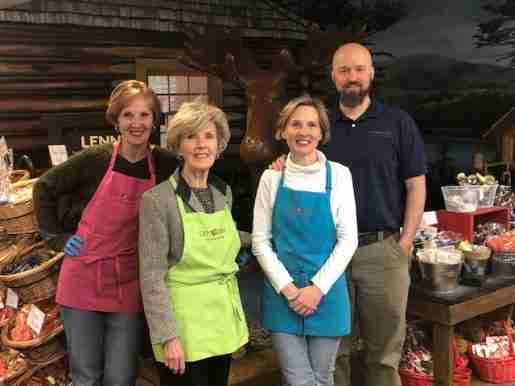By Karen Appold Although many customers were originally drawn to Len Libby Candies in Scarborough, Maine, to see its 1,700-pound chocolate moose, during the COVID-19 outbreak—like many other candy shops—the store has to rely on its reputation for sales.
“Lenny is our mascot and tourist attraction, but we keep customers coming back with our selection of more than 125 different handmade candies made with the finest ingredients,” said John DeGrinney, who owns the shop along with his wife Gisele.  Gisele DeGrinney, co-owner, Len Libby Candies in Scarborough, Maine. The store offers a selection of over 125 different handmade candies. Gisele DeGrinney, co-owner, Len Libby Candies in Scarborough, Maine. The store offers a selection of over 125 different handmade candies. As a food service business, John DeGrinney, pointed out that cleanliness has always been of the utmost importance. During the COVID-19 outbreak, precautions have been stepped up. Employees wear gloves, pull back their hair and constantly washed their hands. “We are taking preventative measures to keep everything clean and tidy and take our sanitization process seriously as well,” he said.
As of March 24, Anna Largay, store owner, Old Port Candy Co., Portland, Maine, could no longer operate as a walk-in retail store due to a shelter-in-place order enacted by the City of Portland. In lieu of this, she planned to offer take-out and curbside pick-up during limited days and hours so she still has time to homeschool her young children.
Largay was the only staff member left in her 900-square-foot store; she had to lay off all of her employees. All sales are going through her website or other local delivery services, so there isn’t any cash register contact. She added e-gift cards to her website, which makes transactions easy. Customers can purchase them online and redeem them online without any in-person contact. The only contact is handing bags to customers at the door.  Len Libby Candies is known for certain confections, including the Bangor Taffy pictured. The recipe is over a 100 years old. Len Libby Candies is known for certain confections, including the Bangor Taffy pictured. The recipe is over a 100 years old. To ensure customers’ safety while the store was still open, Largay removed all the scoops from bulk bins. Staff are the only ones allowed to use them. She also set up a sanitation station with hand sanitizer and disposable gloves. The cash register has a separate keypad for customer use; she encourages credit/debit sales to avoid customer contact.
When her three locations closed to walk-in traffic, Dominique Holl, president, Holl’s Handcrafted Swiss Chocolates, Vienna, W.Va., said her main concerns are with delivering curbside service in as sanitary a fashion as possible. That includes wearing gloves when delivering orders to customers’ cars and requesting that they remotely open their trunks or hatches so that she can place orders in the car while maintaining social distancing.
A.J. Seese, owner, Sweet Darlings, Seward, Alaska, changes sanitary gloves after every order. “After every transaction, we sanitize our credit card system and door handles with a sanitation spray,” he said. “We limit the number of people in the store at one time to 10 or less.”  Sea salt caramels from Len Libby Candies are sought after by customers. Sea salt caramels from Len Libby Candies are sought after by customers.Current Best-Sellers
So what are customers drawn to during troubling times? Largay said prior to Easter, many patrons had Easter on their minds. “We were able to upload all of our Easter candy to our website; some of my biggest orders were for Easter candy,” she said, adding that mail orders for fudge also surged. When the shop was still open to customers they stopped buying bulk candy, which was usually a top seller, along with fudge, after the scoops were removed.
Easter chocolates also became a big seller for Holl during the pandemic. They included chocolate bunnies, filled eggs and assorted basket stuffers. Easter is normally the third biggest holiday of the year following Christmas and Valentine’s Day, she said. She sold a lot of birthday gifts online with messages indicating that since the sender couldn’t celebrate together in person they were mailing a celebratory gift instead.
When Maine’s governor closed all of the state’s restaurants and bars, Gisele DeGrinney, co-owner, said they voluntarily decided to temporarily close the front shop in order to protect guests and employees. They instead fulfilled online orders and took orders over the phone for local pick-up or to ship.  Gisele and John DeGrinney, owners, Len Libby Candies, and Gisele’s mother Maureen Hemond, the previous owner of the business, center. Shown at left is Gisele’s sister Nicole Heisey. John DeGrinney has an optimistic outlook for the business. Gisele and John DeGrinney, owners, Len Libby Candies, and Gisele’s mother Maureen Hemond, the previous owner of the business, center. Shown at left is Gisele’s sister Nicole Heisey. John DeGrinney has an optimistic outlook for the business. John DeGrinney said during the pandemic, customers’ selections haven’t changed. “People wanted the tried-and-true original recipes Len Libby is known for,” he said. That includes Bangor Taffy, whose original recipe is more than 100 years old. “The freshest ingredients must reach the perfect temperature, then be spread on a marble cooling table, cut in squares and covered in confectioner sugar. This yields a very buttery, creamy caramel.”
In addition, Needhams remain popular. “We hand crack 15 coconuts with a hatchet and then peel off the brown layer under the shell,” Gisele DeGrinney said. “We shred the fresh coconuts and mix in the other ingredients in a heated copper kettle. It’s poured on a marble table to cool, and it’s coated in rich chocolate.” Maine sea salt caramels were also sought after. These old-fashioned caramels are made in copper kettles and are covered with chocolate and Maine sea salt.
Seese said that homemade gelato and sorbets remain best-sellers as usual. “The colors, flavors and curiosity appeal to guests,” he said. Operating During a Pandemic
Being flexible is the key to running a business during uncertain times.
Largay forwards the store’s phone calls to her cell phone so she could be more responsive. “I’ve made every effort to get folks what they need,” she said. “I’ve also tried to make the orders extra good; I added extra candy to the bags or a special little treat with a thank you note with their order.”
Davis echoed Largay’s sentiments of needing to be flexible. “When things change so dramatically and quickly, you have to be ready and able to adapt just as quickly,” she said. “We were lucky that the online infrastructure for in-store pickup (now curbside pickup) was already built into our shopping cart software so we could implement that option pretty easily.”
John DeGrinney’s approach has been to err on the side of caution and keep an optimistic outlook. “Before we voluntarily paused all front shop public sales, we erected a sign directing guests to wash their hands in the public sink in our front shop,” he said. “We also made sure employees washed their hands every half hour, in addition to the hand washings mandated by the health code. Regular washing and wiping of all surface areas in the front shop was also required, and we made efforts to get guests to pay by credit rather than handling cash.”
For Seese, opening a window in the back alley to serve as a drive-thru option has worked well. “It really took off in our community,” he said. Keeping Customers Up-to-Date
Using social media has been the best way for Largay to inform customers of changes to the business. She posts on Facebook and Instagram, and updates her website daily so it stays accurate. Signs on the front door let folks know about changes. She also updates other websites such as Yelp about the reduced pick-up schedule.
Largay partners with some food delivery places (e.g., grubhub, 2dinein, ubereats) so she can benefit from some of their services. “It is a double-edge sword; we need to stay safe and in solitude, but as a business owner we have to survive,” she said. “Every sale counts, so I try to make it as good as I could for as long as I could!”
Gisele DeGrinney actively keeps guests up-to-date by using the shop’s website, social media and an oversized reader board on a street sign. “When guests atattempt to enter the shop, a sign on the door gives them the information they need to place an order by phone,” she said. “We take the order, charge their credit card and then fill the order and run it out to them. All of this is done by a team member wearing latex gloves.” The candy kitchen and sales floor space is approximately 5,000 square feet.
Like others, Davis uses email and social media to inform customers about changes to her business’ operations. “We may try some local television if the crisis extends for several more weeks,” she said in late March. “Indications are that local news programming is seeing an increase in viewership with more people at home looking for daily updates.” Final Thoughts
The coronavirus has been a very difficult issue to navigate, as there are very important competing interests which must be considered, John DeGrinney said. “We employ many family members and have long-standing employees who all need to work, and we need their skilled help,” he said. “At the same time, we need to protect our team from undue risk, protect the public from the same and comply with proper considerations and mandates given to us by public safety officials. We believe that everyone needs to keep a positive outlook, have a ‘can do’ attitude and to understand that we can and will get through this together.” |
 Gisele DeGrinney, co-owner, Len Libby Candies in Scarborough, Maine. The store offers a selection of over 125 different handmade candies.
Gisele DeGrinney, co-owner, Len Libby Candies in Scarborough, Maine. The store offers a selection of over 125 different handmade candies. Len Libby Candies is known for certain confections, including the Bangor Taffy pictured. The recipe is over a 100 years old.
Len Libby Candies is known for certain confections, including the Bangor Taffy pictured. The recipe is over a 100 years old. Sea salt caramels from Len Libby Candies are sought after by customers.
Sea salt caramels from Len Libby Candies are sought after by customers. Gisele and John DeGrinney, owners, Len Libby Candies, and Gisele’s mother Maureen Hemond, the previous owner of the business, center. Shown at left is Gisele’s sister Nicole Heisey. John DeGrinney has an optimistic outlook for the business.
Gisele and John DeGrinney, owners, Len Libby Candies, and Gisele’s mother Maureen Hemond, the previous owner of the business, center. Shown at left is Gisele’s sister Nicole Heisey. John DeGrinney has an optimistic outlook for the business.